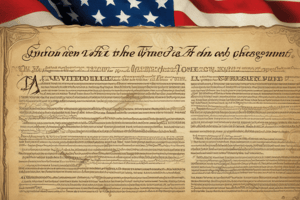Podcast
Questions and Answers
What does the Fourth Amendment protect individuals from?
What does the Fourth Amendment protect individuals from?
- Interference with freedom of religion
- Unwarranted intrusions by government officials (correct)
- Invasive probing by private citizens
- Unreasonable searches of personal belongings
Which right is guaranteed under the Sixth Amendment?
Which right is guaranteed under the Sixth Amendment?
- Right to confront witnesses (correct)
- Freedom of religion
- Freedom of speech
- Right to bear arms
What fundamental liberty does the first amendment guarantee to American citizens?
What fundamental liberty does the first amendment guarantee to American citizens?
- Right to a fair trial
- Freedom of speech (correct)
- Right to bear arms
- Protection against unreasonable searches and seizures
Under which amendment is the right to bear firearms encompassed?
Under which amendment is the right to bear firearms encompassed?
What is the purpose of requiring authorities to obtain a search warrant based upon probable cause?
What is the purpose of requiring authorities to obtain a search warrant based upon probable cause?
Which of the following is NOT a limitation on the freedom of speech in the United States?
Which of the following is NOT a limitation on the freedom of speech in the United States?
What is a key aspect guaranteed under the Sixth Amendment?
What is a key aspect guaranteed under the Sixth Amendment?
What aspect of religious freedom does the First Amendment protect against government interference?
What aspect of religious freedom does the First Amendment protect against government interference?
Which amendment protects individuals' beliefs freely without state interference?
Which amendment protects individuals' beliefs freely without state interference?
Which constitutional amendment protects citizens from unreasonable searches and seizures?
Which constitutional amendment protects citizens from unreasonable searches and seizures?
What is a potential consequence of violating laws related to freedom of speech?
What is a potential consequence of violating laws related to freedom of speech?
Which constitutional right is linked to the ability to protect oneself through ownership of firearms?
Which constitutional right is linked to the ability to protect oneself through ownership of firearms?
Study Notes
Bill of Rights: A Foundational Blueprint for Individual Freedoms
In the wake of America's fight for independence from Great Britain, concerns over securing individual rights and protecting citizens from tyranny led our forefathers to draft and ratify ten amendments known today as the Bill of Rights. These amendments serve as legal safeguards, enshrined within the United States Constitution, ensuring fundamental liberties remain intact despite the shifting winds of government power. Let's delve into several key aspects that make up this cornerstone document.
Freedom of Speech
The first amendment guarantees every American citizen's free expression through various mediums like written, oral, and visual forms without fear of undue censorship by government authorities. This cherished liberty fosters open dialogue, promotes healthy discourse, and safeguards diverse viewpoints – all vital components of a vibrant democracy.
However, it is essential to note that while we enjoy robust protections for speech, there do exist limitations. For instance, inciting violence, obscenity, libel, slander, and threats of harm may violate other laws and could lead to penalties.
Freedom of Religion
A cherished aspect of the First Amendment revolves around religious freedoms. It proclaims that Congress shall pass no law prohibiting the free exercise of one's faith nor establish a national church. As such, Americans can practice their beliefs freely without interference from the state and hold varying convictions with equal respect, including nonbelief itself.
Protection Against Unreasonable Searches and Seizures
Often referred to as the Fourth Amendment, this crucial provision protects individuals from unwarranted intrusions by government officials during investigations. In essence, it requires that authorities obtain a search warrant based upon probable cause before conducting any invasive probing. This measure was established to preserve privacy and prevent arbitrary actions by those tasked with maintaining order and security.
Right to a Fair Trial
Guaranteed under the Sixth Amendment, each American citizen possesses the right to confront witnesses against them; receive a speedy and public trial by impartial jury members drawn from their community. Additionally, defendants have the option to retain counsel to assist them throughout the judicial process. Collectively, these provisions affirm and reinforce confidence within our criminal justice system.
Right to Bear Arms
Encompassed under the Second Amendment, the right to keep and bear firearms has been a subject of intense debate and scrutiny. While some interpretations argue for expansive rights to arm oneself, others contend for stricter regulation to address issues related to gun control and public safety. Regardless, the full extent of its application remains unsettled and continues to evolve through ongoing conversations and legislative action among communities across the nation.
These five elements represent only a fraction of the Bill of Rights' breadth and depth, which also includes additional provisions touching on matters ranging from self-incrimination to habeas corpus. Each amendment serves as a protective shield against abuses of power, providing a foundation of principles that continue to shape the fabric of modern society.
Studying That Suits You
Use AI to generate personalized quizzes and flashcards to suit your learning preferences.
Description
Delve into the foundational document of American liberties, the Bill of Rights, and explore key provisions such as freedom of speech, freedom of religion, protection against unreasonable searches and seizures, right to a fair trial, and right to bear arms. Understand how these amendments serve as crucial safeguards against government overreach and ensure individual rights remain protected.




